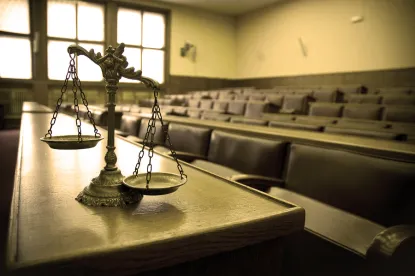On June 4, 2020, the Jury Subgroup of the COVID-19 Judicial Task Force of the U.S. federal courts issued a report (the “Report”) containing recommendations for conducting jury trials and convening grand juries during the pandemic. Although many federal courts have continued to hold remote hearings and conferences over the last few months, jury trials have largely been suspended across the country to protect the safety of potential jurors and court personnel. However, as government stay-at-home orders are lifted and courts prepare to reopen their doors, advocates have called for the reinstatement of jury trials to maintain litigants’ constitutional rights and preserve public confidence in the courts. Convened to recommend directives and policy changes related to the COVID-19 health emergency, the Task Force is made up of federal judges, clerks, attorneys, and executives from a number of circuits across the U.S.
The Report contains several categories of guidance for all aspects of the jury trial process, so that jurors and potential jurors are protected each step of the way, while also ensuring litigants receive the procedural protections guaranteed by the Constitution. Especially important are the courts’ efforts to make people feel safe as they are called to jury duty, so they can effectively focus on the evidence presented and come to a fair verdict. Jurors, attorneys, and clients can all expect the configuration of courthouses and the trial proceedings themselves to differ from pre-COVID operations in light of these new recommendations.
The Report’s suggestions include:
-
Screening procedures to identify and excuse jurors and prospective jurors exposed to the virus, or who are ill, symptomatic, immunocompromised, or responsible for caring for others who are ill.
-
Publication of all COVID-related safety measures on court websites.
-
Reimbursement for parking, so that jurors can avoid public transportation.
-
Social distancing measures, including:
-
Limiting juror-to-juror and juror-to-personnel contact;
-
Seating the jury in the gallery rather than the jury box, with the witness stand in front of counsel and the gallery;
-
Televising the trial to a separate courtroom or a remote video system to allow the public to observe;
-
Permitting attorneys and witnesses to argue or testify from another room via video, to avoid having to wear masks; and
-
Use of telephones, iPads, or special apps to facilitate side-bars outside the presence of the jury and confidential attorney-client conversations.
-
-
Increased use of computer monitors to show exhibits while avoiding cross-contamination by the handling of paper documents.
-
Regular deep-cleaning of juror-occupied spaces.
Rather than recommending face coverings be required within the courthouse, the Report notes that each court will need to make its own decisions regarding PPE, and suggests plexiglass shields in at least some spaces as an alternative. For example, at least some courts, such as the Southern District of New York, are installing plexiglass shields on witness stands to allow witnesses to take off their masks while testifying.
The right to a trial by jury is a foundational component of our justice system, grounded in common law jurisprudence, and expressly provided for in both criminal and civil cases by the Constitution and the Sixth and Seventh Amendments. The Sixth Amendment also affords criminal defendants the right to a “speedy” and public trial, to keep the wheels of justice moving and promote prosecutorial accountability, as well as the right to confront witnesses face-to-face, in court. In light of these principles, the Report urges, “the judiciary must reconstitute jury trials during the COVID-19 pandemic”—although it is up to individual courts to determine the best time to do so based on the unique circumstances of each jurisdiction (emphasis added).
However, the suggested measures will have to be balanced against additional constitutional concerns. Ironically, although these measures are meant to address speedy trial and witness confrontation issues, they may end up compounding these issues and creating colorable grounds for a mistrial, certainly if courts allow witnesses to appear remotely or require face masks in criminal cases. Moreover, a face mask requirement potentially would make it more difficult for counsel to assess the jury’s reactions to the evidence, and for the jury to evaluate witness credibility—arguably hallmarks of a fair trial. The Task Force recommends that judges order pre-trial briefing on these topics and take special precautions to ensure any waiver of a constitutional right due to COVID-19 measures clearly is entered on the record.
Counsel and their clients should be prepared to voice any concerns and take a position on these issues, to ensure protection of the public health and that the justice system continues to operate in a fair and transparent manner.




 />i
/>i
